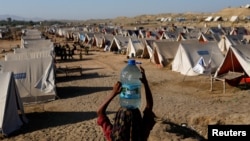The United Nations dramatically hiked its lifesaving appeal Tuesday to help Pakistan, where erratic rains and a combination of riverine, urban and flash floods have unleashed an unprecedented global climate-change-induced disaster since June.
The international funding appeal, jointly launched with the Pakistani government from Geneva, is seeking $816 million — five times more than the $160 million flash appeal issued in August, in the wake of the immensity of the calamity and growing needs.
Pakistani officials say the floods have inundated huge swaths of the country of about 220 million people. The calamity has claimed the lives of nearly 1,700 people, one-third of them children, and it has displaced almost 8 million people. Women and children make up 70% of the 33 million affected across 84 districts nationwide, with an estimated 3.4 million children in need of assistance.
“The water has stopped rising but the danger has not,” Tedros Adhanom Ghebreyesus, the World Health Organization’s chief, told Tuesday’s televised launch event. He said an urgent and robust response is needed, along with sustainable funding, to control the spread of outbreaks of malaria, cholera, dengue, and an increase in skin infections in flood-ravaged areas.
“We're on the verge of a public health disaster. Many more lives than were lost in the floods could be lost in the coming weeks if we don't mobilize greater support for Pakistan … We estimate that more than 2,000 women are giving birth every day, most of them in unsafe conditions,” Tedros said.
Pakistani Climate Change Minister Sherry Rehman said while addressing the ceremony that 16 weeks later, 34 districts are still crisis-affected, with 11 districts still under water.
Rehman said her government is still in what she described as “the longest rescue, relief and lifesaving phase” since the disaster struck and her country can’t afford recovery from the flooding on its own.
“[The] 33 million people affected are 7 million more than the entire population of Australia. We have been working around the clock. But honestly, ladies and gentlemen, we literally need a new coalition of the willing. It can be done for wars so it can be done to save lives,” the minister stressed.
Rehman said Pakistan was in urgent need of medicine for 8.2 million people and must import extra supplies of food.
U.N. officials warned of growing hunger in Pakistan, saying the deluge inundated more than 3.6 million hectares of farmland and killed more than 1.1 million livestock.
Pakistani officials estimate the flooding has inflicted more than $30 billion in damages on national infrastructure, washing away roads, bridges and about 800,000 houses.
“The people of Pakistan are bearing the brunt of the world's inaction to face up to climate change or to prepare for its consequences. It’s a stain on our conscience internationally,” said U.N. Emergency Relief Coordinator Martin Griffiths, while speaking at the Geneva event.
“The people of Pakistan have not caused this crisis for which they are undeserving victims and they're paying the unimaginable price of its impact.”




